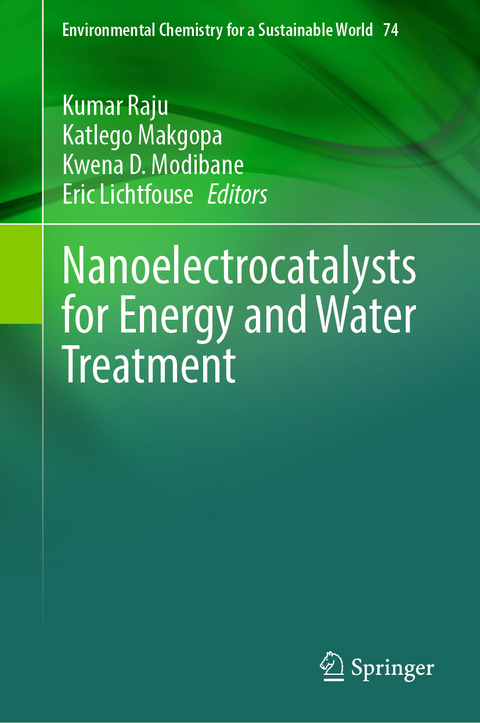
Nanoelectrocatalysts for Energy and Water Treatment
Springer International Publishing (Verlag)
978-3-031-55328-8 (ISBN)
Nanomaterials have recently garnered significant attention and practical importance for heterogeneous electrocatalysis. This book presents recent developments in the design, synthesis, and characterisation of nanostructured electrocatalytic materials, with a focus on applications to energy and wastewater treatment. Electrocatalytic nanomaterials can enhance process efficiency and sustainability, thus providing innovative solutions for a wide array of areas such as sustainable energy production, conversion, and wastewater treatment. Readers will gain insights into the latest breakthroughs in electrocatalysis and the activity of nanomaterials in energy conversion applications, e.g., fuel cells, hydrogen production, water splitting, and electro/photocatalytic water splitting, as well as for wastewater treatment. The book explores the development of advanced electrocatalysts, particularly hybrid materials.
Kumar Raju is currently a Faraday Institution Research Fellow at the Institute of Manufacturing (IfM), Department of Engineering, University of Cambridge, United Kingdom. He conducted his doctoral research at the University of Madras, India, followed by postdoctoral work at Hanyang University, South Korea. He also worked for several years as a senior research scientist at the Energy Centre, Council for Scientific and Industrial Research (CSIR), South Africa. His current research focuses on the processing of advanced cathode materials, encompassing the development of innovative methods for structuring electrode materials and studying their processing into advanced electrodes for batteries and supercapacitors. Dr Raju actively engages with the international scientific community, serving as a reviewer for numerous scientific journals. He has received several research excellence awards, including the CSIR Energy Centre Emerging Researcher Award.
Dr. Katlego Makgopa is a Physical Chemistry Lecturer, Deputy Director of Centre for Applied Chemistry Research (CACRe), and a Leader of the Nanomaterials for Electrochemistry Applications Research Team (NEART), Chemistry Department, Tshwane University of Technology (TUT), South Africa. He is a C2-rated researcher recognized by the National Research Foundation (NRF), South African and serve as the President of the South African Nanotechnology Initiative (SANi). His current research interests entail the electrochemistry of nanostructured materials and their potential applications in energy storage (i.e., supercapacitors), hydrogen production and wastewater treatment. He has published his research findings in various high impact factor international peer-reviewed journals in the form of articles and book chapters, and presented his research outputs at several scientific conferences. He has participated as reviewer for many accredited international journals, a member of several scientific/professional societies (SACNASP, SACI and SANi) and has attracted several funding from NRF, South Africa.
Kwena D. Modibane is currently working at the University of Limpopo (UL) as an associate professor, and leader of the Nanotechnology Research Group (NanoRG@UL), South Africa. He is the DSI-NRF South African Research Chair Initiative (SARChI) Chair in Green Hydrogen. His duties involve lecturing of third and second levels in the area of Analytical and Inorganic Chemistry; and specialized topics on electrochemistry, advanced separation techniques and spectroscopies at Honours level. He is also a part-time Lecturer (since 2013) at the University of the Western Cape (UWC) for MSc Nanoscience Programme, where he teaches electrochemical energy, kinetics and thermodynamics of hydrogen energy storage and conversion processes, and photophysical chemistry. His current research outputs are on preparation of nanocomposites for various applications such as electrochemical hydrogen production, hydrogen storage, supercapacitors and water treatment. He participates in several research activities aimed at keeping himself abreast with trends in his field, as reviewer for a number of journals that include Elsevier journals, Nature and Springer. He received the University of Limpopo Vice Chancellor's established Researcher Award for 2019 in the school.
Dr. Eric Lichtfouse is professor of environmental chemistry and scientific writing at Xi'an Jiatong University. Eric Lichtfouse graduated with a Bachelor and a Master of Science in Organic Chemistry from Claude Bernard University, Lyon, and a PhD Thesis in Organic Geochemistry from Louis Pasteur University, Strasbourg, in 1989. After post-doctoral positions at Indiana University, USA, in 1990, and the KFA Juelich Research Center, in 1992, he did molecular and isotopic research on carbon and contaminants in soils, waters, plants and the atmosphere at Pierre and Marie Curie Univers
1. Fundamentals and roles of nanoelectrocatalysis for sustainable energy and water.- 2. Advanced Nanomaterials for Hydrogen Production.- 3. Emerging nanoelectrocatalysts for the oxidation of ethanol in alkaline fuel cells.- 4. Carbon Nanostructures as Support Material in Fuel Cells.- 5. Challenges and Approaches of Nanoelectrocatalysts for Fuel Cell.- 6. Development of advanced Pd-based electrocatalysts for high performing fuel cell system.- 7. Progress in metal-organic framework composites for electrocatalytic hydrogen evolution reaction.- 8. Advanced Nanomaterials for Hydrogen Production.- 9. Bio-inspired metal-metal oxides as Pd support catalysts for CO2 electro-reduction into electrofuels.- 10. Nanostructured copolymer and dendrimer-based sensor for the detection of organic pollutants in wastewater samples.- 11. Recent developments in titania-carbon nanotube nanohybrids towards enhanced photocatalytic efficiency.- 12. Nanostructured silver-iron-functionalized titanium dioxide photo electrocatalyst for industrial effluent remediation.- 13. Nanoelectrocatalysts-enhanced methods for removal of volatile organic compounds in wastewater.
| Erscheinungsdatum | 21.05.2024 |
|---|---|
| Reihe/Serie | Environmental Chemistry for a Sustainable World |
| Zusatzinfo | XI, 497 p. 189 illus., 142 illus. in color. |
| Verlagsort | Cham |
| Sprache | englisch |
| Maße | 155 x 235 mm |
| Themenwelt | Sachbuch/Ratgeber ► Natur / Technik ► Natur / Ökologie |
| Naturwissenschaften ► Chemie ► Technische Chemie | |
| Naturwissenschaften ► Geowissenschaften ► Hydrologie / Ozeanografie | |
| Technik | |
| Schlagworte | catalysis • Electro Chemistry • Energy harvesting • Energy systems • Water pollution |
| ISBN-10 | 3-031-55328-4 / 3031553284 |
| ISBN-13 | 978-3-031-55328-8 / 9783031553288 |
| Zustand | Neuware |
| Informationen gemäß Produktsicherheitsverordnung (GPSR) | |
| Haben Sie eine Frage zum Produkt? |
aus dem Bereich


